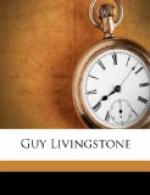How agreeable he was about the small hours, chirping over his grog; alternating between reminiscences of “My tutor’s daughter” and recitals of choice morsels in verse and prose; misquoting, to the utter annihilation of rhythm and sense, but all with perfect gravity, good faith, and satisfaction!
Nec te, memorande, relinquam—true Tom Lynton! not clever, not even high-bred, but loved by every one for the honestest and kindest heart that ever was the kernel of a rough rind.
Do we not remember that supper where the Fathers of England were being discussed? Every one, drawn on by the current, had a stone to throw at his relieving officer, the complaint, of course, being a general tightness in the supplies. At last, Tom, who, though his own sire was an austere man, could not bear to hear the absent run down, broke in, gravely remonstrating,
“Well, gentlemen,” he said, “remember they’re our fellow-creatures, at all events.”
They drank “Lynton and the Governors” with a compound multiplication of cheers.
I might mention more; but a face rises just now before me which makes me close the muster-roll—the face of one who united in himself many, very many of the best qualities of the others; of one whom I shrink from naming here, lest it should seem that I do so lightly—a face that I saw six hours before its features became set forever.
CHAPTER IV.
"De tot’ anaschomeno,
ho men elase dexion omon
Iros, ho d’ auchen’
elassen hup’ ouatos, ostea d’ eiso
Ethlasen; autika d’
elthen ana stoma phoinion haima."
Toward the end of my second year an event came off in which we were all much interested—a steeplechase in which both Universities were to take part. The stakes were worth winning—twenty sovs. entrance, h.f., and a hundred sovs. added; besides, the esprit de corps was strong, and men backed their opinions pretty freely. The venue was fixed at B——; the time, the beginning of the Easter vacation.
The old town was crowded like Vanity Fair. There was a railway in progress near, and the navvies and other “roughs” came flocking in by hundreds, so that the municipal authorities, justly apprehensive of a row, concentrated the cohorts of their police, and swore in no end of specials as a reserve.
The great event came off duly, a fair instance of the “glorious uncertainty” which backers of horses execrate and ring-men adore. All the favorites were out of the race early. Our best man, Barlowe, the centre of many hopes, and carrying a heavy investment of Oxford money, was floored at the second double post-and-rail. The Cambridge cracks, too, by divers casualties, were soon disposed of. At the last fence, an Oxford man was leading by sixty yards; but it was his maiden race, and he lost his head when he found himself looking like a winner so near home. Instead of taking the stake-and-bound




